What a weekend – and there’s more to come! Pastor Isaiah arrived from Haiti last Friday, visited his cousin in Fort Wayne for a week, then traveled to Michigan to be with us. We hit the ground running!
On Saturday we prepared and set up the PPI Summer Picnic. Isaiah helped us mow, vac and put up a tent, tables and chairs. We had a full day of work but still had time to catch up and take a swim along the way.
On Sunday morning we shared PPI’s vision with New Life Christian Fellowship in Saginaw (watch HERE). New Life recently joined our support team, which we’re very excited about! Pastor Ken and Joan Cline, the GO Team and congregation have encouraged and blessed us so much. We look forward to partnering together in training pastors in Haiti and other developing nations.
Later that afternoon we welcomed many PPI friends and supporters to the PPI Summer Picnic. We enjoyed a game (“What Do You Know about Haiti and PPI?”), complete with prizes, tasty picnic foods, conversation and fellowship. After dinner Isaiah and I updated everyone on PPI and answered questions. Isaiah shared insights from James 4:7 – Submit yourselves therefore to God. Resist the devil and he will flee from you. What a wonderful summer afternoon and evening! Time with friends ranks high on the list of God’s greatest gifts. Time together enjoying our friendship and sharpening our focus on what matters for eternity ranks even higher. Thank you, friends, for engaging in the many ways we can do that together!
On Thursday morning, Pastor Isaiah and I depart for two weeks of travel on the East Coast. We will visit with present PPI friends and also with potential supporters in New York, New Jersey, Philadelphia and North Carolina. Please pray for our travels and look for our updates in Where’s Pastor Isaiah? emails.
Christ’s love and blessings to you all. Enjoy the pics below.

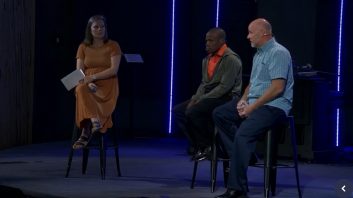

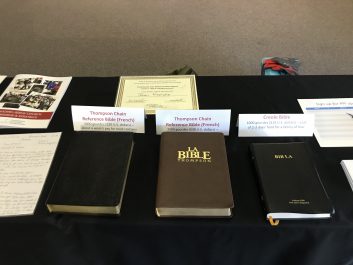
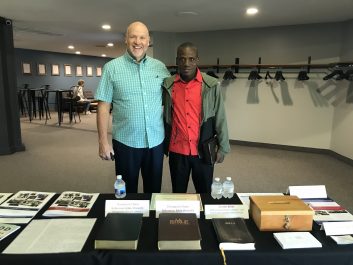
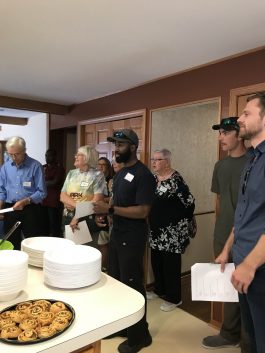
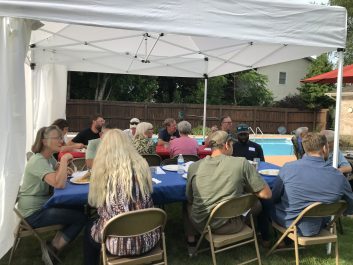

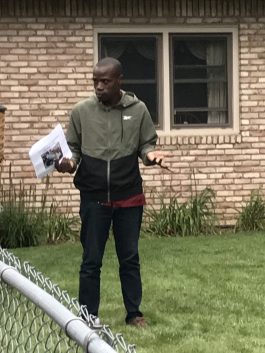
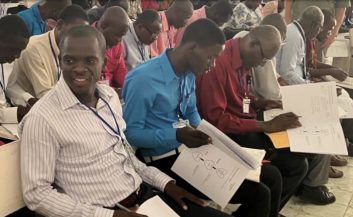 Thank you for participating recently in our Shop and Share (SAS) project. You “shopped” and gave toward Bibles (especially!), course workbooks, team T-shirts, a communion set, and more. Thank you! We have purchased or are in process of purchasing each of these items for our next training courses or for our Haitian team members. (They’re excited!)
Thank you for participating recently in our Shop and Share (SAS) project. You “shopped” and gave toward Bibles (especially!), course workbooks, team T-shirts, a communion set, and more. Thank you! We have purchased or are in process of purchasing each of these items for our next training courses or for our Haitian team members. (They’re excited!) You’re invited to PPI’s Summer BBQ on Sunday, August 13, from 5:00-7:30pm. We’ll gather at Ken and Rena’s house (465 Mayflower Drive, Saginaw, MI) for good food and conversation, a PPI update, and QA time with Ken and Pastor Isaiah. (Isaiah will be with us from Haiti.) We will provide meat, drinks, condiments and all paper products. Please bring a dish to pass and RSVP
You’re invited to PPI’s Summer BBQ on Sunday, August 13, from 5:00-7:30pm. We’ll gather at Ken and Rena’s house (465 Mayflower Drive, Saginaw, MI) for good food and conversation, a PPI update, and QA time with Ken and Pastor Isaiah. (Isaiah will be with us from Haiti.) We will provide meat, drinks, condiments and all paper products. Please bring a dish to pass and RSVP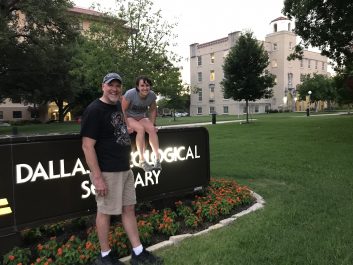 We helped our daughter, Katie, move from Dallas to Columbus last week and, along the way, met some very cool people. Can I be Dad for a moment? We’re super proud of Katie! While working in Ann Arbor, she engaged with young adults for Christ through her church, company and living situation. As she did that, she realized she needed more Bible training to effectively reach her generation for Christ. So, during COVID, Katie moved to Dallas to pursue a master’s degree in Evangelism and Apologetics at
We helped our daughter, Katie, move from Dallas to Columbus last week and, along the way, met some very cool people. Can I be Dad for a moment? We’re super proud of Katie! While working in Ann Arbor, she engaged with young adults for Christ through her church, company and living situation. As she did that, she realized she needed more Bible training to effectively reach her generation for Christ. So, during COVID, Katie moved to Dallas to pursue a master’s degree in Evangelism and Apologetics at  Before the heavy lifting, I got to hang around the seminary for two days to work and engage with old and new friends. I engaged with a number of American students on everything from what DTS was like when I was a student (!) to the Rapture to the “big picture” of the Bible. I especially wanted to hear their thoughts on the church and their part in Jesus’ global mission.
Before the heavy lifting, I got to hang around the seminary for two days to work and engage with old and new friends. I engaged with a number of American students on everything from what DTS was like when I was a student (!) to the Rapture to the “big picture” of the Bible. I especially wanted to hear their thoughts on the church and their part in Jesus’ global mission. While working in the Student Center, I also met Sam Skaria, a pastor from India and, since January, a master’s student at DTS. I learned that Sam and his wife, Febe, lead a network of churches in Bangalore, India. After 20 years of church planting and pastoring, Sam believes the Lord is leading him to go deeper in the Scriptures, Christian theology and church leadership. He told me, “I’ve been good at planting and growing churches. We have worked hard at that. But now I must grow more in making disciples and training church leaders.” Amen! More and more, the government of India is passing laws to restrict even outlaw evangelical Christianity.
While working in the Student Center, I also met Sam Skaria, a pastor from India and, since January, a master’s student at DTS. I learned that Sam and his wife, Febe, lead a network of churches in Bangalore, India. After 20 years of church planting and pastoring, Sam believes the Lord is leading him to go deeper in the Scriptures, Christian theology and church leadership. He told me, “I’ve been good at planting and growing churches. We have worked hard at that. But now I must grow more in making disciples and training church leaders.” Amen! More and more, the government of India is passing laws to restrict even outlaw evangelical Christianity.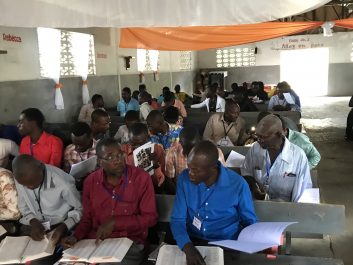 After getting back home, I talked by phone with Pastor Isaiah and Pastor Jasmin, key members of the PPI training team in Haiti. I love these brothers! We caught up on our families then finalized details for our next training courses in Haiti. We also looked ahead to 2024. Both told me that many pastors thank the Lord for PPI training and that so many pastors are asking about our training!
After getting back home, I talked by phone with Pastor Isaiah and Pastor Jasmin, key members of the PPI training team in Haiti. I love these brothers! We caught up on our families then finalized details for our next training courses in Haiti. We also looked ahead to 2024. Both told me that many pastors thank the Lord for PPI training and that so many pastors are asking about our training! Everybody likes a good deal when they shop. We replaced a car in December to get an end-of-year price (it worked). A few nights ago, Rena and I combed through tons of pendant lights on Build.com to find the right one at the best price for our bathroom remodel (it didn’t work). We shop online, we shop local, we sign up for loyalty and frequent flyer programs. But it’s
Everybody likes a good deal when they shop. We replaced a car in December to get an end-of-year price (it worked). A few nights ago, Rena and I combed through tons of pendant lights on Build.com to find the right one at the best price for our bathroom remodel (it didn’t work). We shop online, we shop local, we sign up for loyalty and frequent flyer programs. But it’s  Think about it: When have you experienced the greatest joy and purpose? Was it in buying something special for yourself, or was it in giving something special to someone else? What about times you’ve had opportunity to share what God has given you with a person who needed it? Talk about joy! Talk about a sense of purpose! Talk about blessed!
Think about it: When have you experienced the greatest joy and purpose? Was it in buying something special for yourself, or was it in giving something special to someone else? What about times you’ve had opportunity to share what God has given you with a person who needed it? Talk about joy! Talk about a sense of purpose! Talk about blessed!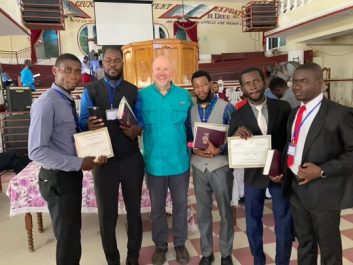 The Lord burned a question on my heart some years ago while in Haiti: How should I live as an American Christian when the basic needs – basic needs! – of so many brothers and sisters in places like Haiti consistently go unmet? I’m convinced the Lord wants me to answer that question by sharing my time, encouragement, love, knowledge, experience and resources with church leaders in Haiti and other developing nations. So many lack access to good ministry training and resources. As part of the wealthiest generation in the history of the Church, we are uniquely placed to do something about that!
The Lord burned a question on my heart some years ago while in Haiti: How should I live as an American Christian when the basic needs – basic needs! – of so many brothers and sisters in places like Haiti consistently go unmet? I’m convinced the Lord wants me to answer that question by sharing my time, encouragement, love, knowledge, experience and resources with church leaders in Haiti and other developing nations. So many lack access to good ministry training and resources. As part of the wealthiest generation in the history of the Church, we are uniquely placed to do something about that! Our Haitian ministry team identified PPI T-shirts as one of our next steps. Logo shirts identify our ministry team members for church leaders in our courses and also build team unity. We’re planning an initial order of 30 colored T-shirts with our PPI logo on the front (in French) and, on the back, “EKIP MINISTÈ A” (MINISTRY TEAM) and “Mete spa pou levanjil Bondye a.” Women 1:1 (Set apart for the gospel of God. (Romans 1:1)). Estimated cost – $360 ($12 per shirt).
Our Haitian ministry team identified PPI T-shirts as one of our next steps. Logo shirts identify our ministry team members for church leaders in our courses and also build team unity. We’re planning an initial order of 30 colored T-shirts with our PPI logo on the front (in French) and, on the back, “EKIP MINISTÈ A” (MINISTRY TEAM) and “Mete spa pou levanjil Bondye a.” Women 1:1 (Set apart for the gospel of God. (Romans 1:1)). Estimated cost – $360 ($12 per shirt).  30 Diploma Covers for Graduation
30 Diploma Covers for Graduation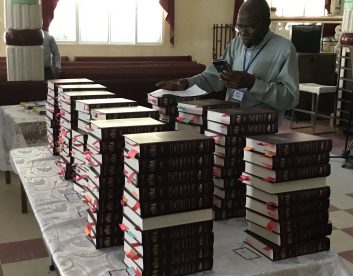 In 2024, as the Lord provides, we plan to offer 11 PPI courses in Haiti in eight key cities in four different Departments of the country. We award 112 Thompson Bibles every time we offer Course 1. The Thompson Chain Reference Bible is our foundational resource for training indigenous church leaders. We need a total of 784 Bibles for the rest of this year and for 2024! Estimated cost – $23,520 ($30 per Bible).
In 2024, as the Lord provides, we plan to offer 11 PPI courses in Haiti in eight key cities in four different Departments of the country. We award 112 Thompson Bibles every time we offer Course 1. The Thompson Chain Reference Bible is our foundational resource for training indigenous church leaders. We need a total of 784 Bibles for the rest of this year and for 2024! Estimated cost – $23,520 ($30 per Bible).  Pastor Isaiah serves as the second (associate) pastor of a growing church in Ouanaminthe. The congregation of La Boussole (The Compass) shares communion every Sunday and needs a set of communion trays to make serving the Lord’s Supper easier. The problem is, it’s nearly impossible to find these items in Haiti, and if you do, they’re very expensive. Isaiah asked me in April if I could find a communion set for his church and take the cost out of his PPI pay. I think we can do better than that! Let’s bless this congregation with a communion set to remember the Lord’s sacrifice for us. Estimated cost – $300.
Pastor Isaiah serves as the second (associate) pastor of a growing church in Ouanaminthe. The congregation of La Boussole (The Compass) shares communion every Sunday and needs a set of communion trays to make serving the Lord’s Supper easier. The problem is, it’s nearly impossible to find these items in Haiti, and if you do, they’re very expensive. Isaiah asked me in April if I could find a communion set for his church and take the cost out of his PPI pay. I think we can do better than that! Let’s bless this congregation with a communion set to remember the Lord’s sacrifice for us. Estimated cost – $300. 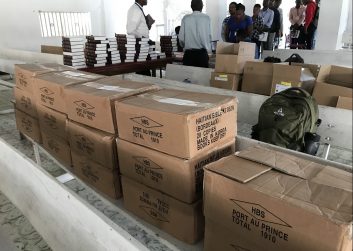 We provide extra ministry resources to church leaders in each PPI course, Creole Bibles being the most needed. Increasingly, Creole Bibles are difficult to get in Haiti, and they’re expensive. Estimated cost – $13,500 ($13.50 per Bible).
We provide extra ministry resources to church leaders in each PPI course, Creole Bibles being the most needed. Increasingly, Creole Bibles are difficult to get in Haiti, and they’re expensive. Estimated cost – $13,500 ($13.50 per Bible). 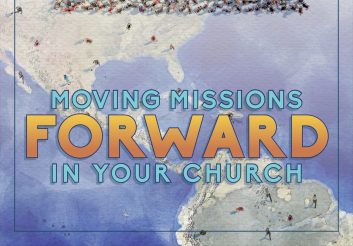 Ken is writing a missions resource for U.S. churches titled Moving Missions Forward in Your Church, which will be ready for publication soon. (More details to come!) This book is
Ken is writing a missions resource for U.S. churches titled Moving Missions Forward in Your Church, which will be ready for publication soon. (More details to come!) This book is